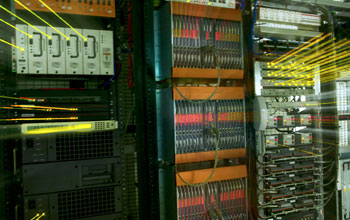News Release 12-194
NSF Makes Awards to Improve Campus Networking in Support of Data-Intensive Science
Nearly $22 million awarded to enable U.S. research communities to take advantage of Big Data

NSF-funded networking projects adapt and improve U.S. university and college computer networks.
October 12, 2012
This material is available primarily for archival purposes. Telephone numbers or other contact information may be out of date; please see current contact information at media contacts.
The National Science Foundation recently awarded nearly $21.6 million to 34 campus-level networking projects to adapt and improve U.S. university and college computer networks that are necessary for movement of the large data sets required for data-intensive scientific research.
Made through NSF's Campus Cyberinfrastructure-Network Infrastructure and Engineering (CC-NIE) program, the awards will enable academic research networks to run applications and share large, complex data, which are part of an expanding Big Data revolution.
Twenty-three states and 34 institutions across the country received awards.
"It's good that so many academic institutions are taking advantage of this opportunity," said Alan Blatecky, director of NSF's Office of Cyberinfrastructure (OCI), which funded the awards. "We are building a phenomenal portfolio that benefits NSF's academic research communities."
The CC-NIE program was developed from a series of community discussions and input to enable NSF academic research communities to upgrade their campus-level fiber optic infrastructure and make improved, dynamic networks a reality. It leverages emerging networking capacities and capabilities, including research and innovation from the NSF-funded Global Environment for Networking Innovation project, which is some 250 times faster than networks available today.
"One of the goals of CC-NIE is to take advantage of network research and development results and to explore how they can be integrated and applied at the campus level," said Kevin Thompson, CC-NIE program manager for NSF. "We see enormous potential to drive innovation in data networking this way and, at the same time, deliver usable networking services and capabilities to the NSF research and education community."
The 34 CC-NIE projects support two categories of awards:
- Network Integration and Applied Innovation projects that aim to achieve higher levels of performance, reliability and predictability for science applications and distributed research projects, and
- Data Driven Networking Infrastructure for the Campus and Researcher projects that invest in improvements and re-engineering at the campus level to make use of dynamic network services that support a range of scientific data transfers and movement.
Network Integration and Applied Innovation awards provide support of up to $1 million for up to two years. These awards address the challenges of achieving end-user network performance across complex, distributed research and education environments. They seek to integrate existing and new technologies with applied innovations by taking advantage of network research results, prototypes and emerging innovations--and using them to achieve higher levels of performance, reliability and predictability.
Data Driven Networking Infrastructure awards provide support of up to $500,000 for up to two years and address network infrastructure improvements at the campus level. These awards, for example, support upgrading and re-architecting campus networks to support movement of a wide range of large science data sets to include large files, sensor networks, distributed and real-time data.
A complete list of awardees and projects is available on the NSF website.
-NSF-
Media Contacts
Bobbie Mixon, NSF, (703) 292-8070, email: bmixon@nsf.gov
Lisa-Joy Zgorski, NSF, (703) 292-8311, email: lisajoy@nsf.gov
Program Contacts
Kevin Thompson, NSF, (703) 292-4220, email: kthompso@nsf.gov
The U.S. National Science Foundation propels the nation forward by advancing fundamental research in all fields of science and engineering. NSF supports research and people by providing facilities, instruments and funding to support their ingenuity and sustain the U.S. as a global leader in research and innovation. With a fiscal year 2023 budget of $9.5 billion, NSF funds reach all 50 states through grants to nearly 2,000 colleges, universities and institutions. Each year, NSF receives more than 40,000 competitive proposals and makes about 11,000 new awards. Those awards include support for cooperative research with industry, Arctic and Antarctic research and operations, and U.S. participation in international scientific efforts.
Connect with us online
NSF website: nsf.gov
NSF News: nsf.gov/news
For News Media: nsf.gov/news/newsroom
Statistics: nsf.gov/statistics/
Awards database: nsf.gov/awardsearch/
Follow us on social
Twitter: twitter.com/NSF
Facebook: facebook.com/US.NSF
Instagram: instagram.com/nsfgov


